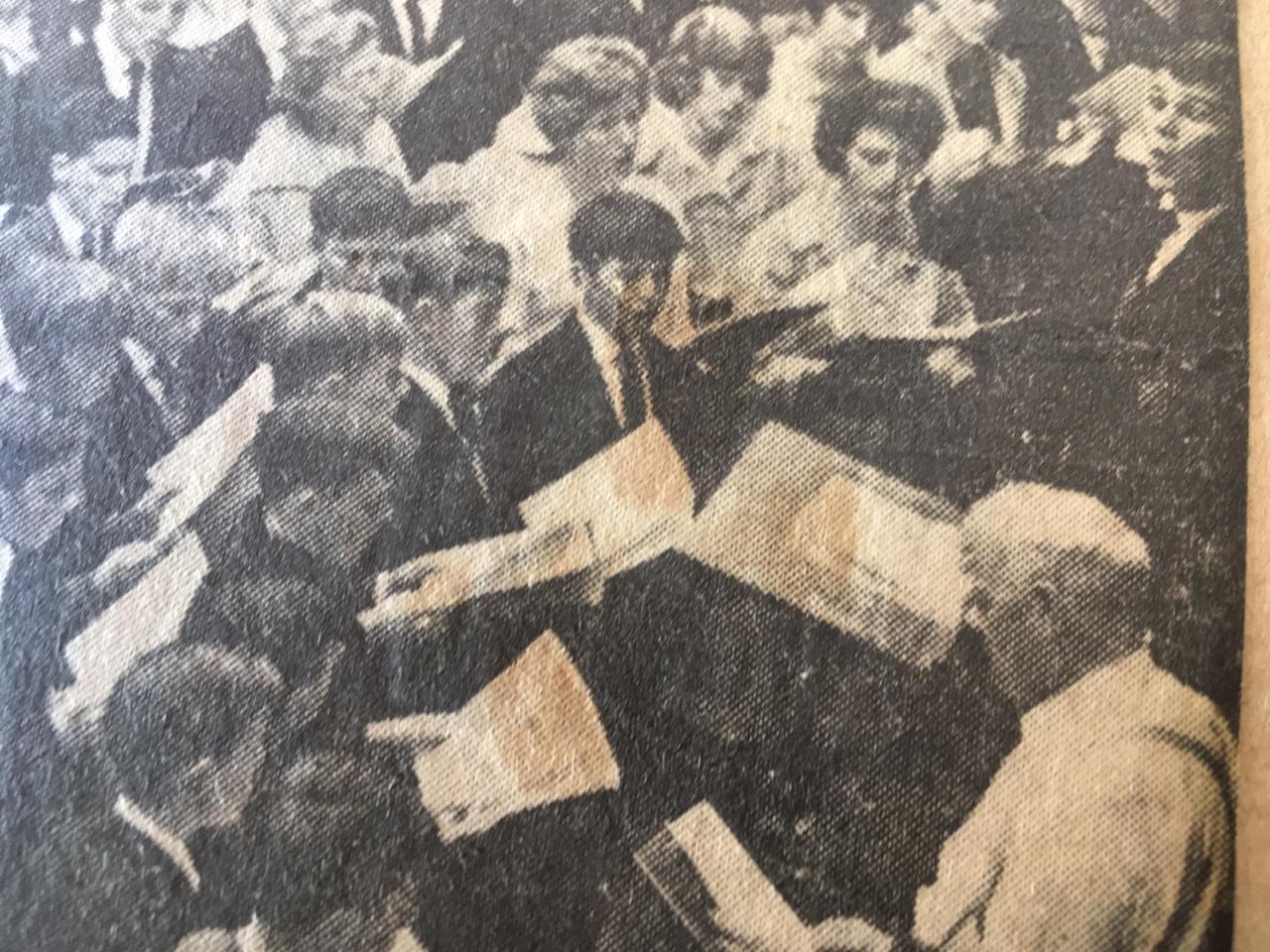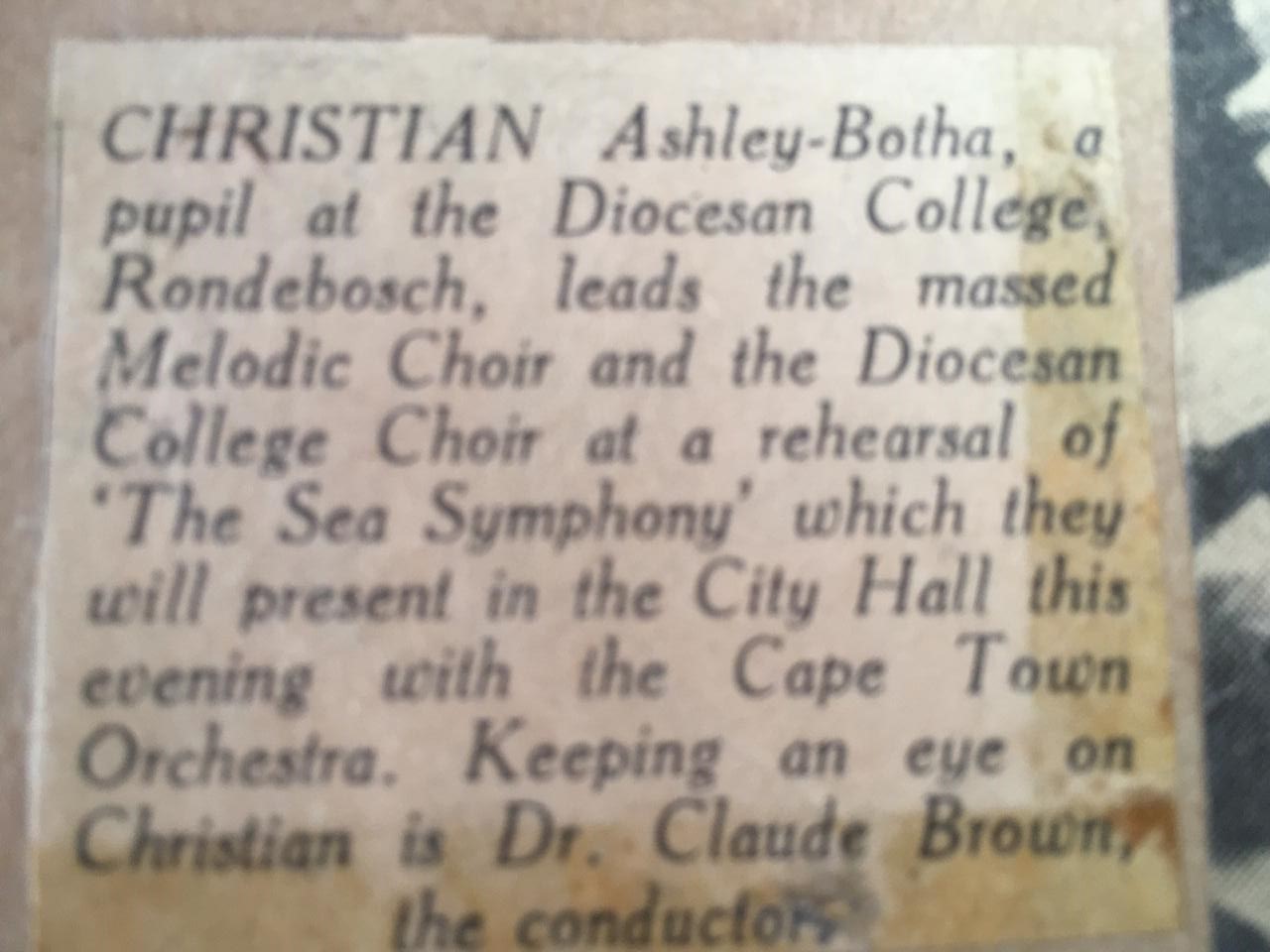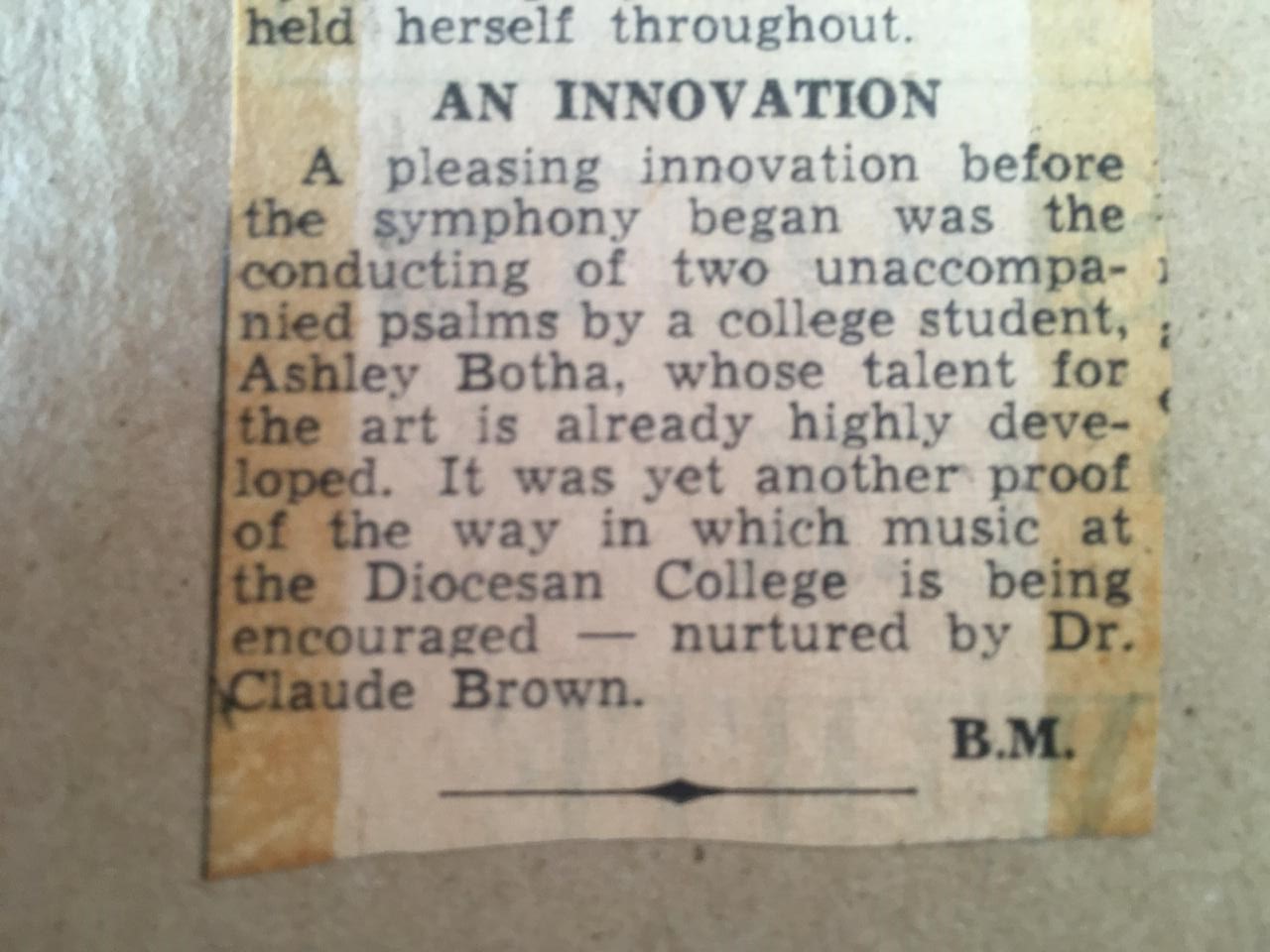Memories of two Head Choristers at Bishops by Richard Cock (O:1966, PM:1967).

Above: Christian Ashley-Botha Conducting - see the inscription immediately below.

Above: This is the inscription that accompanies the photo above.

Above: Commentary on Music at Bishops, referring to Christian Ashley-Botha conducting in the photo above.
Memories of two Head Choristers at Bishops.
Recently, just before the COVID 19 lockdown, in my acceptance speech when I received the Robert Gray Medal, I mentioned two Head Choristers who had a lasting influence on me, and I’d like to expand on that by talking about them in a little more detail.
I joined the Bishops Choir as soon as I started in the Prep school in 1962, and the Head Chorister at that time was Christian (Bunny) Ashley-Botha. He was already conducting the choir when he was in matric, and continued this when he did post-matric in 1963. He seemed to me to be an amazing musician even then…he played the oboe, and the cello, sang, conducted and was Claude Brown’s right hand man for everything. Doc Brown was director of music at that time. And Bunny was given opportunities for doing all he could for the music in the school. I have no idea if he did music for matric…I doubt it, as no one did music as a subject in those days. It was not considered an academic subject as far as I can remember. There were also no such things as cultural colours or awards. The most one could hope for was one of the dedicated music prizes which were given out at the end of the year, such as the Brian Guillemard Piano prize, or the Andrew Porter Singing prize…perhaps someone better qualified than I can shine some light on these prizes. We know that Andrew Porter (OD) became the Music Critic and Editor of the Musical Times, but who was Brian Guillemard?
Bunny was head of house of White House, so he had a natural authority as well, which raised him still higher in my estimation. He was not a great sportsman, and I have no recollection of his being involved in any sport. So the fact that he was a school prefect may have been because he was so involved in the music, and had such a natural authority.
These were the years when we started to make Long Playing Records of the choir, and while I was in the choir we made three. One each year from 1963. Michael Fisher (staff) who sang in the choir used to record every service and concert, and there must have been quite an archive somewhere of all those reel-to-reel tapes. I wonder what happened to them? But when it came to an LP, an outside recording engineer was brought in. It’s interesting now to listen to these recordings and to hear the sound which the choir made. Occasionally one can hear a discreet accompaniment on the piano from Dr Brown, even in apparently unaccompanied anthems or songs! Many of these items were conducted by Bunny, and I sang as a soloist on all three recordings. One of the pieces was written by Doc Brown especially for Anthony Thomson and me to sing: We wait for thy loving kindness . It must have received its first and last performance at that time.
Bunny also conducted in the City Hall…Two Psalms by Gustav Holst at a concert given by the Melodic Choir and the Bishops Choir. In his post –matric year he organised and conducted a performance of Benjamin Britten’s Let’s Make an Opera, at the Prep School. I was asked to be part of it, although I was by now in the College, and to my everlasting shame, I turned down his request. This was a shame, because in my later life I have come to love the music of Benjamin Britten, and I myself have conducted several important works by him: Noye’s Fludde in Chichester Cathedral, with Patrick Garland directing, St Nicholas Cantata several times, and most recently War Requiem both in Germany and South Africa. And of course many smaller works as well, and I have sung solo in quite a few performances of his work Rejoice in the Lamb. I should have sung for Bunny, and I regret now not doing it. His organisation of that event was amazing for a young man of 17.
When he left College, he went the following year to the Royal School of Church Music at Addington Palace , Croydon, in the UK, and after two years there, returned to South Africa to take up a post as Director of Music at St Andrew’s Bloemfontein, where he stayed just over ten years. He took over at St Andrews from Colin Yorke(OD). This in itself is an amazing story as Colin had gone straight to St Andrews as Director of Music on leaving school. Such was the quality of training given by Claude Brown. After St Andrews, Bunny went on to Kimberley Boys’ High, where he stayed for just one year before taking up the position of Director of Music at the Drakensberg Boys’ Choir School in in 1981. And this is where our paths crossed again. I was by then back in South Africa after an eight-year stint in the UK first as a student, also at the Royal School of Church Music, and then a seven year spell at Chichester as a singer in the Cathedral Choir and later as assistant organist. Bunny and I soon linked up again, and our two choirs, the boys’ choir, and the choir which I established very soon after returning to SA, the SABC Chamber Choir (Chanticleer Singers), regularly appeared together for concerts for TV and in concert halls. Sometimes I provided men for his choir, because they needed more tenors and basses, and sometimes we performed with the two choirs together. These were magnificent collaborations, and they led in later years to the Drakensberg Choir appearing at Starlight Classics when I was directing those. The boys were a key element in the concerts, and it resulted in a very fruitful relationship between the sponsor of the concerts, Rand Merchant Bank, and the Drakensberg school, and resulted in a new building at the school, funded by the bank. On a memorable occasion I also sang the Counter-tenor solos in Handel’s Messiah at the Linder Auditorium with Bunny conducting the Drakensberg Boys’ Choir. In fact I was the first professional counter-tenor in South Africa, having made my living doing this (along with teaching) at Chichester Cathedral.
The strong links between us as conductors, and the similarity of our styles of choir- and voice -training also meant that many ex-Drakies came to sing in my choirs in Johannesburg once they had left school. I still have many in my choirs, although Bunny left the Drakies in 2006 after 25 years of incredible and devoted service to that institution.
The following Head Chorister in 1964 was Alec (Granny) Grant…another extremely talented and unusual person. He was not a conductor of the choir as Bunny was, but a motivator and organiser of note. He was an excellent pianist and I remember his playing Ibert’s Le Petit Ane Blanc at a music concert in the Memorial Hall. He was an inspired head of choir, and led by him, and Gordon Denby, we made two further recordings of the choir. Alec was also an excellent actor, and he produced, much as Bunny had done with Let’s make an Opera, an amazing outdoor performance of King Lear. This was given in front of the then Brooke Library, now the smaller of the two chapels. Hal Kent was King Lear, and Alec had to stand in at the last minute for the Fool who had become ill…he was incredible. As a young standard 8 boy I was given the task of making the blood for the putting out of Gloucester’s eyes. I did this with a sort of religious fervour, using tomato sauce…this was in 1964, which I think was also Alec’s post-matric year. How he fitted everything in I don’t know. The second LP, which he helped to produce , was A Recital Of Carols, really a record of the sort of things which were performed at the Nine Lessons and Carols service, which was an annual highlight of the musical year at Bishops. This was a service which Doc Brown had instituted and nurtured in his 31 years at Bishops.
Once again for this recording, many boys sang solos, and Michael Robinson accompanied most of the pieces . Mike and Alec met up again in the UK, and I was lucky enough to keep in touch with Alec before his studies got in the way! His letters, which I have kept, were very amusing, as he describes his fellow students, and his life as a first year medical student.
He talks much of his days at Bishops…..of bi-colour ( a type of punishment),legalised murder (rugby), organised waste of time (cricket), and “B practice” which was a dumping ground for people who were not in any under 15 or under 16 team…I myself, also not being a great sportsman , was in that until I was promoted to under 15F Rugby! Alec was in charge of this “B practice” and it was very much something to keep people busy for two afternoons a week. It was quite an unruly group, and he writes “I even had to sentence some unfortunate specimen to the workings of The Beating Machine”. Corporal punishment was still very much the order of the day at Bishops, and every morning there would be a queue of boys waiting outside Housemaster’s studies waiting to be beaten for some very often minor infraction of the law!
He mentions some of the boys in the choir also:
“Poor Shrimp (Philip Wood) and Dr Jekyll (Charles McGregor) appear to have succumbed to the initial onslaught of ‘serfdom’ (being a newboy), Beating Machines and Slave Drivers (i.e. Junior House Officials in charge of rec-room etc). You must warn them , however, not to become rebellious, otherwise things will not brighten up. I noticed signs of rebellion in Shrimp last year, which I thought might sooner or later come to the surface. Tell Dr Jekyll not to mutter oaths during choir practice times, but that these should be restricted solely to sermon time on Sunday nights when Mr Dallas (le Page ,the chaplain)is speaking dangerous words from that shocking purple pulpit” .
I still enjoy reading these letters even now, as they conjure up an era which is long gone, (a bit like the purple pulpit!) but were so vivid at the time.
Our paths crossed again when I moved to Chichester and he moved with his family to West Sussex. By this time he was a Junior House Officer in Portsmouth at the hospital there. His sister and her family lived nearby and two of their children were at the choir school. It was the LP A Recital of Carols which appeared one day with my name on it and a small piping voice of an eight year old, Alec’s nephew, pointing to my name on the sleeve asked ”Is this you, Sir?”. Indeed it was me, and so I met up again with Alec and his family. Some years later they moved to South Africa, and we met up when our families used to gather on a Friday night at Porta Romana in Parktown North, Johannesburg for an evening meal. We often used to reminisce about our days in the choir! To him I was still Punctual Boy! And of course the common bond of our years together in the choir under our eccentric choir-master, Claude Brown, was important .
This went on for many years, until his very sudden death , which was never explained, and for which an open verdict was declared.
I saw Bunny shortly before he died, and so two very special people passed out of my life. They both knew that they had had a strong influence on me, and I will remember them both for the important role they played at Bishops, and the enormous influence they had on my career, and on me as a person. They were both unusual, talented and very human people….even as lofty prefects at a time when that elevation could have created a distance between people at school. They remained as friend, supporter and mentor to me till the end of their lives. And both of them left the world a better place.
Richard Cock (O:1966)
